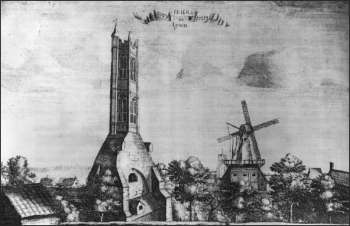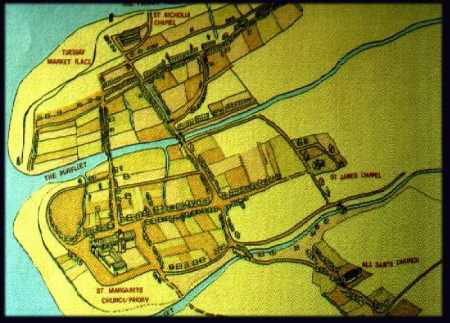|
1/.VOLll
Page768-768
A Mill perhaps attached to the adjacent Monastery once occupied a spot
near St Margarets School (now a Club) Probably converted into a Windmill
when the supply of water became inadequate. Subsequently it became an
Oyle Mill and the Tar office erected on site. (see:4/.)
2/. Vol l Page 22
Subject "MOATED MOUNDS"
The burg on the foreshore of the LIN was near a freshwater stream which
was diverted to form not only a moat on the East and North but moreover
a Mill Leat on the South which drove the Town Mill until a recent date.
The Water Mill appears on RASTRICK'S Plan c.1725 and was in line with
the St James Workhouse. Parts of the oak frame (22 in by 20 in by 9 ft
and 16 in by 16 in by 5 ft) in which the overshot wheel worked were discovered
during the sewage undertaking c.1901
3/. Vol.l Page 71-72
Subject "THE DUALISTIC BURG
At the close of the 12th Century the Town was made up of two parts each
being owned by different Religious Factions. THE NEWLAND (NEWLONDE) formed
part of the Bishop's personal estate and the original or "OLDLAND"
belonged to the Monks of Norwich. Between the Bishop and the Prior there
was a rivalry and estrangement, for, as owners, each endeavoured to reap
the greatest pecuniary advantage from his possession. For our Mills interest
the Water Mill in the Oldland was driven by Sunolf's Fleet subsequently
termed the Mayors Mill Fleet to distinguish it from Bishop's Mill Fleet
where in the vicinity of Littleport Street, in the Newland, once stood
the Bishops Mill. To the owners, the Monks and the Bishop, these mills
were valuable "paying concerns". Mills were necessary adjuncts
to Manorial Residences, hence they were, as a rule, erected by the Lord
of the Manor for his own use and for those living on his estate. To compensate
him for his outlay the tenants were bound to bring their corn to his Mill
to be ground. They did not however pay in cash for the grinding, but were
under an obligation termed Mill Service (seeta debita molendini); in other
words they were compelled to leave a portion of their meal with the bailiff
or the miller to recoup their patron for services rendered.
4/. Vol.ll Page 738
Subject: MINOR UNDERTAKINGS
The Vicar of ALL SAINTS the Reverend JOHN NORRIS refers in his will to
an "Oyle House" outside the EAST GATES c.1503 where sperm oil
for lighting purposes was apparently stored. But the "Oyle Mills"
of a later date as we learn from old engravings possessed sails but no
chimneys; hence they were erected for crushing Linseed. During the 18th
Century an Oyle Mill may have been seen in the Tower Field, on its site
a tar office where pitch was turned into tar subsequently stood. There
was also an Oyle Mill in South Lynn which resembled a warehouse attached
to lofty Windmill. This building the framework of which was brought from
Holland c.1638 was destroyed by fire 30 July 1737. In 1668 it belobged
to a Mr SOUTHERBY of London and was let to Alderman Henry BELL and Mr.
Robert BELL at an annual rent of £20 conspicuously the highest in
the Parish the next being £12. In more recent times there was another
Oyle Mill standing upon the Western bank at no great distance from the
Bentinck Dock. It was run by a Mr. FEATHERSTONHAUGH who lived at West
Lynn.
Lynn Mills from H.J.Hillens' History of King's Lynn
|


